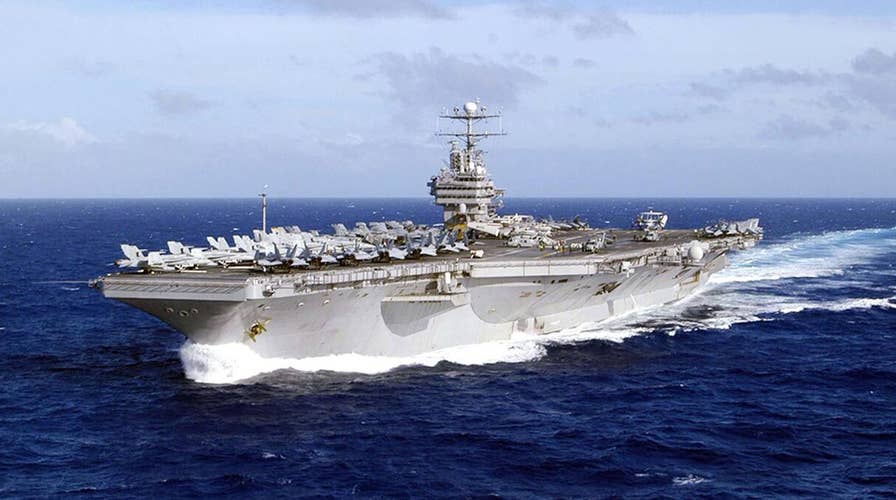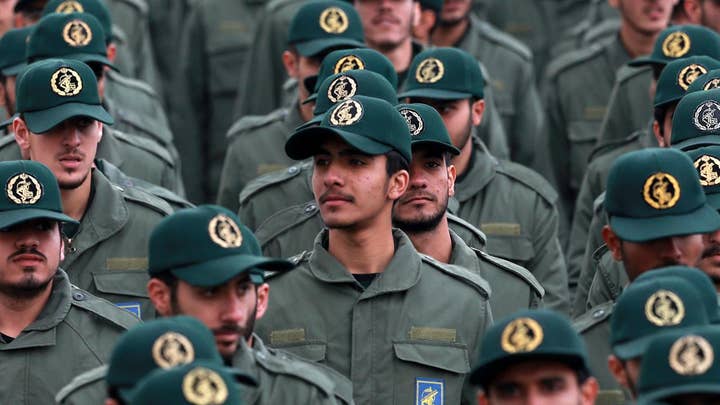US deploys strike group to send 'clear and unmistakable' message to Iran
The U.S. is sending the USS Abraham Lincoln Carrier Strike Group and a bomber task force to the Middle East, National Security Adviser John Bolton announces; Lucas Tomlinson has the latest from the Pentagon.
The United States is sending a Navy carrier group to the Middle East. Why? Because it can.
It’s a continuation of the tit-for-tat struggle between the White House and the regime in Tehran that’s been going on for over a year – ever since the U.S. withdrew from the Obama-era Iran Deal.
Washington has no confidence in that deal, which gave Tehran hard cash and sanctions relief up front in exchange for weak restrictions, with sunset clauses, on its nuclear weapons program. Moreover, Iran’s conduct since signing the deal – its support for surrogate forces terrorizing the region and its attempt to use Syria as a strategic corridor for threatening the survival of Israel – has further dismayed the U.S.
Tehran wasn’t happy when Trump pulled out of the deal. The regime faces troubles from within: protests, a tanking economy and botched responses a natural disaster. And it is now more isolated from the international community, due to Washington’s leadership.
Iran appears, however, to be largely trying to wait Trump out, hoping national elections in the U.S. next year will ring in a new president more interested in going back to Obama-era concessions.
That’s not to say Iran has been complacent. The regime continues to fund its troublemaking surrogates (including Hamas, Hezbollah, the Houthi rebels in Yemen and Shia militia in Iraq). It has troops on the ground in Syria. And it has threatened to close the strategically important Straits of Hormuz, through which flows much of the Middle East’s oil.
Washington, in turn, has ratcheted up the pressure on the mullahs. It recently declared it would no longer waive enforcing sanctions against those who continue to buy Iranian oil. The U.S. also designated a key paramilitary group in the Iranian regime as a terrorist organization.
Now, to put an exclamation point on the seriousness of the U.S. effort, the administration has pointedly announced the deployment of U.S. forces to the region.
In part, the military move is nothing new. The U.S. has periodically deployed carrier groups to the region, exercising its ability to flex forces when they are needed to meet a crisis and for training purposes. There had been reports a U.S. deployment was being planned well before the sudden announcement from the White House this weekend.
The U.S. is not the world’s policeman or its babysitter, but it doesn’t want to be blindsided by bad actors who think Washington is so preoccupied elsewhere that they can take advantage of the situation. Thus, the U.S. has to demonstrate it is present and capable of acting where it needs to.
Still, the rotation of strike groups to the Gulf rarely gets announced by the National Security Adviser in a high-profile press release. That announcement came on the heels of a barrage of rocket attacks on Israel by the Palestinian Islamic Jihad group, which is heavily supported by Iran.
There is no question Trump wanted to send Tehran a message: The U.S. may choose to retaliate against Iran for its proxy attacks on our friends and allies. There may even be intelligence on possible Iranian Revolutionary Guard plots to attack U.S. forces in the Middle East.
One thing is for certain, there is no slackening in the U.S. resolve to squeeze the boys in Tehran.
It’s particularly worth noting that the U.S. signaled this action even as the White House is dealing with a number of hot button foreign policy issues, from the chaotic mess in Venezuela to the latest round of rocket tests by North Korea. Clearly, the administration wants to show Iran that these goings-on have not distracted its attention from the Middle East.
The U.S. is a global power, with interests and responsibilities around the world. If it can’t demonstrate it can defend all those interests, it stops being a global power. In particular, the U.S. has to be concerned about stability on Europe, the Middle East and the Indo-Pacific – regions where our economic and political interests are the greatest.
Demonstrating, that the U.S. can act in the Persian Gulf – even as it ramps up commitments to NATO, deals with North Korea, and tussles with Chinese and Russian meddling in the Western Hemisphere – is crucial.
CLICK HERE TO GET THE FOX NEWS APP
The U.S. is not the world’s policeman or its babysitter, but it doesn’t want to be blindsided by bad actors who think Washington is so preoccupied elsewhere that they can take advantage of the situation. Thus, the U.S. has to demonstrate it is present and capable of acting where it needs to.
The deployment to the Gulf will be a deterrent to conflict because it shows the world that the U.S. will act wherever necessary to protect its vital interests. Testing the U.S. is the last step any adversary should want to take, Tehran included.


